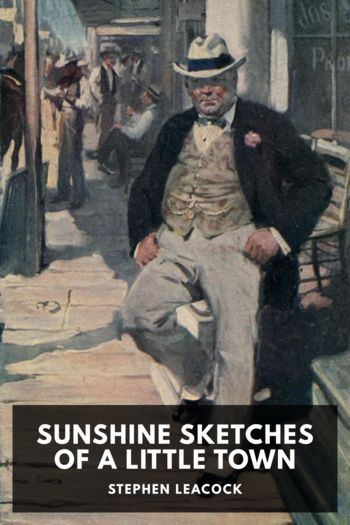Sunshine Sketches of a Little Town, Stephen Leacock [people reading books .TXT] 📗

- Author: Stephen Leacock
Book online «Sunshine Sketches of a Little Town, Stephen Leacock [people reading books .TXT] 📗». Author Stephen Leacock
There was, I say, the Greek language. The Dean always showed the greatest delicacy of feeling in regard to any translation in or out of it that he made from the pulpit. He was never willing to accept even the faintest shade of rendering different from that commonly given without being assured of the full concurrence of the congregation. Either the translation must be unanimous and without contradiction, or he could not pass it. He would pause in his sermon and would say: “The original Greek is ‘Hoson,’ but perhaps you will allow me to translate it as equivalent to ‘Hoyon.’ ” And they did. So that if there was any fault to be found it was purely on the side of the congregation for not entering a protest at the time.
It was the same way in regard to machinery. After all, what better illustrates the supreme purpose of the All Wise than such a thing as the dynamo or the reciprocating marine engine or the pictures in the Scientific American?
Then, too, if a man has had the opportunity to travel and has seen the great lakes spread out by the hand of Providence from where one leaves the new dock at the Sound to where one arrives safe and thankful with one’s dear fellow-passengers in the spirit at the concrete landing stage at Mackinaw—is not this fit and proper material for the construction of an analogy or illustration? Indeed, even apart from an analogy, is it not mighty interesting to narrate, anyway? In any case, why should the churchwardens have sent the rector on the Mackinaw trip, if they had not expected him to make some little return for it?
I lay some stress on this point because the criticisms directed against the Mackinaw sermons always seemed so unfair. If the rector had described his experiences in the crude language of the ordinary newspaper, there might, I admit, have been something unfitting about it. But he was always careful to express himself in a way that showed—or, listen, let me explain with an example.
“It happened to be my lot some years ago,” he would say, “to find myself a voyager, just as one is a voyager on the sea of life, on the broad expanse of water which has been spread out to the northwest of us by the hand of Providence, at a height of five hundred and eighty-one feet above the level of the sea—I refer, I may say, to Lake Huron.” Now, how different that is from saying: “I’ll never forget the time I went on the Mackinaw trip.” The whole thing has a different sound entirely. In the same way the Dean would go on:
“I was voyaging on one of those magnificent leviathans of the water—I refer to the boats of the Northern Navigation Company—and was standing beside the forward rail talking with a dear brother in the faith who was journeying westward also—I may say he was a commercial traveller—and beside us was a dear sister in the spirit seated in a deck chair, while near us were two other dear souls in grace engaged in Christian pastime on the deck—I allude more particularly to the game of deck billiards.”
I leave it to any reasonable man whether, with that complete and fair-minded explanation of the environment, it was not perfectly proper to close down the analogy, as the rector did, with the simple words: “In fact, it was an extremely fine morning.”
Yet there were some people, even in Mariposa, that took exception and spent their Sunday dinner time in making out that they couldn’t understand what Dean Drone was talking about, and asking one another if they knew. Once, as he passed out from the doors of the Greater Testimony, the rector heard someone say: “The Church would be all right if that old mugwump was out of the pulpit.” It went to his heart like a barbed thorn, and stayed there.
You know, perhaps, how a remark of that sort can stay and rankle, and make you wish you could hear it again to make sure of it, because perhaps you didn’t hear it aright, and it was a mistake after all. Perhaps no one said it, anyway. You ought to have written it down at the time. I have seen the Dean take down the encyclopaedia in the rectory, and move his finger slowly down the pages of the letter M, looking for mugwump. But it wasn’t there. I have known him, in his little study upstairs, turn over the pages of the Animals of Palestine, looking for a mugwump. But there was none there. It must have been unknown in the greater days of Judea.
So things went on from month to month, and from year to year, and the debt and the charges loomed like a dark and gathering cloud on the horizon. I don’t mean to say that efforts were not made to face the difficulty and to fight it. They were. Time after time the workers of the congregation got together and thought out plans for the extinction of the debt. But somehow, after every trial, the debt grew larger with each year, and every system that could be devised turned out more hopeless than the last.
They began, I think, with the “endless chain” of letters of appeal. You may remember the device, for it was all-popular in clerical circles some ten or fifteen years ago. You got a number of people to write each of them three letters asking for ten cents from three each of their friends and asking each of them to send on three similar





Comments (0)